Dermatologists are medical professionals specializing in diagnosing and treating a wide range of skin conditions. These conditions can vary greatly in terms of their causes, symptoms, and severity.
Here are some of the most common skin conditions that dermatologists frequently encounter and treat:
- Acne: Acne is a common skin condition characterized by pimples, blackheads, whiteheads, and sometimes cysts or nodules. It often occurs during adolescence but can affect people of all ages.
- Eczema (Atopic Dermatitis): Eczema is a chronic inflammatory skin condition that results in dry, itchy, red, and inflamed patches of skin. It can be triggered by factors such as genetics, allergens, or environmental irritants.
- Psoriasis: Psoriasis is a chronic autoimmune condition that causes the rapid buildup of skin cells, resulting in thick, red patches covered with silvery scales. It can cause itching, discomfort, and sometimes joint pain.
- Dermatitis: Dermatitis refers to inflammation of the skin and encompasses a range of conditions such as contact dermatitis (caused by contact with irritants or allergens), seborrheic dermatitis (characterized by red, scaly patches on the scalp and face), and others.
- Rosacea: Rosacea is a chronic inflammatory skin condition that primarily affects the face, causing redness, visible blood vessels, and sometimes pustules or bumps. It can also cause a burning or stinging sensation.
- Skin Cancer: Skin cancer, including melanoma, basal cell carcinoma, and squamous cell carcinoma, is one of the most common types of cancer worldwide. Dermatologists play a crucial role in diagnosing and treating skin cancer through methods such as biopsies, excisions, and Mohs surgery.
- Warts: Warts are noncancerous skin growths caused by the human papillomavirus (HPV). They can appear anywhere on the body and may vary in size, shape, and texture.
- Fungal Infections: Fungal infections such as athlete’s foot, ringworm, and fungal nail infections are common skin conditions caused by fungi. They can cause itching, redness, scaling, and discomfort.
- Hives (Urticaria): Hives are raised, itchy welts on the skin that can vary in size and shape. They are often triggered by allergens, medications, infections, or other factors.
- Vitiligo: Vitiligo is a skin condition characterized by the loss of pigment in patches of skin, resulting in white or depigmented areas. It occurs when melanocytes, the cells responsible for producing pigment, are destroyed.
These are just a few examples of the diverse range of skin conditions that dermatologists diagnose and treat on a daily basis. Seeking prompt medical attention from a dermatologist can help effectively manage these conditions and improve the health and appearance of the skin.





Comments